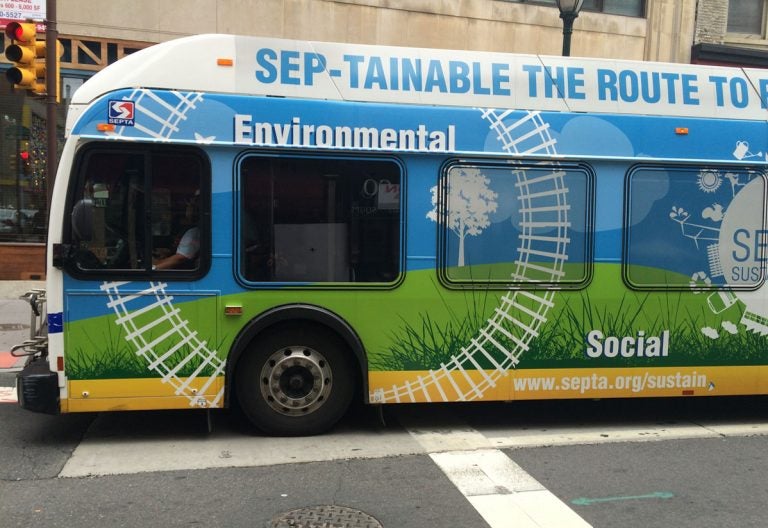ACLU sues SEPTA, claiming ad policy violates First Amendment
SEPTA did not immediately respond to a request for comment.
Listen 2:31
(Jim Saksa/PlanPhilly)
If you ride SEPTA, you’ve seen a few ads.
A bus wrapped in a Pat’s advertisement is like billboard on wheels for greasy, 3 a.m. cheesesteak glory. Posters on the subway promote personal injury lawyers.
Thanks to steak shops and slip-and-fall law firms, SEPTA makes $16 million a year in marketing revenues. But the steady flow of ad dollars may be about to hit a legal traffic jam.
The ACLU of Pennsylvania filed suit Wednesday morning against SEPTA on behalf of the Center for Investigative Reporting. They wanted to run a series of ads highlighting a story on racial disparities in mortgage lending. [Disclosure: WHYY co-published a Center of Investigative Reporting article on disparities in Philadelphia mortgage lending. WHYY also airs CIR’s radio show, Reveal, Sundays at 4.]
Advertising on SEPTA vehicles “reaches this really broad base of people in Philadelphia that other types of advertising schemes don’t,” said Victoria Baranetsky, CIR’s general counsel. “They really do have a really robust advertising system. So, it is important that it remains open to all those participating in our democratic conversations.”
SEPTA rejected the CIR ads, saying they ran afoul of its lengthy advertising policy, which prohibits a wide array of paid messages based on 22 criteria. The CIR ads were dinged for being “political in nature” and for “expressing or advocating an opinion, position or viewpoint on matters of public debate about economic, political, religious, historical or social issues.”
SEPTA did not immediately respond to a request for comment.
SEPTA is a government entity. And advertisements are a form of speech. So when SEPTA bans certain ads, it’s censoring speech, which the First Amendment usually doesn’t allow. And it doesn’t help that SEPTA’s regulations are so broad, said Molly Tack-Hooper, a staff attorney with the ACLU of Pennsylvania representing CIR.
“Anytime that the government has vague standards to censor speech, there’s a real risk the government will manipulate those standards to shut down controversial or unpopular speech,” said Tack-Hooper.
That’s precisely what SEPTA did here.
SEPTA adopted its advertising policy in 2015, after a court forced the transit agency to run offensive ads attacking Muslims and trying to tie them to Hitler. Those messages were deemed constitutionally protected free speech. The court in that case called SEPTA’s advertising space a “designated public forum” – in other words, akin to the proverbial town square where the citizenry would gather to engage in the free trade of ideas.
By banning all sorts of debatable speech, SEPTA hopes the courts will now call the ad space on the side of public transit vehicles nonpublic forums — more like a message board for IRS employees than public debate stage. Then it’ll be able regulate ads without running afoul of the First Amendment.
“SEPTA’s ad policy has really turned the First Amendment on its head: saying the more important the speech is, the less SEPTA wants it on its buses and subways,” said Tack-Hooper. “Courts have twice found SEPTA’s ad spaces as a designated public forum. Our argument is that they can’t simply tack on a bunch of new prohibitions and convert it into a non-public forum.”
If the ACLU wins, SEPTA may decide to end advertisements rather than place ads that scare off riders. In that case, the cost of free speech will be no speech at all, and a loss of $16 million in revenue. Tack-Hooper’s fine with that — saying the First Amendment’s worth way more.
“Certainly SEPTA always can decide to not run an ad business anymore,” she said. “It can always stop soliciting ads from the public and just put up its own ads, and then it can put up whatever banal, non-offensive content it wants without any problem.”
WHYY is your source for fact-based, in-depth journalism and information. As a nonprofit organization, we rely on financial support from readers like you. Please give today.





